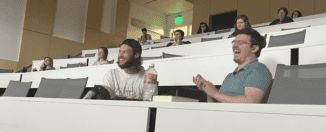Rev. Mark Rosenau Shares Experiences with Prison Ministry
By April Bayer
Rev. Mark Rosenau recently visited Concordia’s campus to speak about his experiences during his ministry as a prison chaplain in his presentation “Prison Ministry: The Good, Bad and Ugly.”
Rosenau graduated from Concordia in 1973 and began his career as a Director of Christian Education, later attending seminary to become a pastor. He began serving as the Protestant chaplain at the Nebraska State Penitentiary through a three-month internship with the Nebraska District of the Lutheran Church–Missouri Synod and ended up staying for 20 years, retiring in 1998. During that time, Rosenau also served as the pastor of Calvary Lutheran Church in Lincoln and later accepted a call to Good Shepherd Lutheran Church in Owatonna, Minnesota.
Students, faculty and community members gathered in Thom Auditorium on Tuesday, Feb. 12 to hear Rosenau share the positive and negative elements of his experiences and his thoughts on capital punishment.
Rosenau said one of the most significant things he learned in his ministry was that 80 percent of the male inmates in the maximum security prison where he served came from church backgrounds, but most had stopped attending at young ages and experienced personal struggles that affected their mental and emotional well-being.
“These men needed to grow in their own emotional understanding of why they lived the way they did and why they reacted to life situations the way that they did,” Rosenau said. “Their misunderstanding of their emotions contributed greatly to their crime. It contributed greatly to a whole trail of broken relationships for them throughout their lives.”
Rosenau began by discussing the “good” aspects of prison ministry, speaking about the relationships he was able to form with prisoners, the things he learned about human behavior and his own personal biases, and the ways he saw faith impact the lives of the inmates.
“I don’t know that I’d ever given any thought to whether the church was present in the prison, but it was pretty obvious that it was. God’s Word was being proclaimed. It existed as we confess in our confessions in Word and Sacraments,” Rosenau said. “I saw a community of faith that resembled more the first-century church than it does the church in our culture today–men who are coming to faith, men whose faith is being enlivened, who have a strong desire to integrate that faith into their life and to be able to share that with others.”
Rosenau also reflected on the struggles he faced as a prison chaplain, which he referred to as the “bad” parts of prison ministry. Not only did he witness violence, manipulation and aggression among the inmates, but he also faced struggles with the prison administration. Rosenau said he was made to feel like an inconvenience to the prison employees, who often forgot when he was coming to lead services or told him it was a bad time to visit. He also had to attend budget hearings with the Nebraska legislature every few years to explain the benefits of ministry in the prison and the importance of his position.
“Today, many states have no chaplains in their department of corrections,” Rosenau said. “They’ve replaced them with volunteer coordinators, and they haven’t saved much money. What they’ve lost is that they don’t have people serving in religious services who are knowledgeable about faith issues, much less maybe even care about faith issues.”
Rosenau concluded his presentation by speaking on capital punishment, an issue which has recently been much-debated in Nebraska. The state legislature voted to repeal the death penalty in 2015, but a petition drive suspended the measure until the next public vote. Voters rejected the repeal in the Nov. 2016 election, and the death penalty was reinstated.
Rosenau asked the audience to consider several questions regarding the death penalty. Is it actually a deterrent? Does a person about to commit murder actually stop to consider the consequences? Are capital punishment laws enforced speedily and effectively? Are death sentences imposed fairly and accurately across the board? Rosenau said that while Scripture does permit the government to use the sword, if it is going to do so, it should be done consistently, fairly and effectively.
“As a Lutheran Christian, I do not take issue with the state executing capital felons. The Scriptures definitely give the government authority for that. But…the state is not required to execute, so I ask the question, ‘Are there other options available which equally can protect society and may come with less of a cost?’” Rosenau said.
Three of Nebraska’s last four executions occurred while Rosenau was serving at the prison, and he said he knew two of the three men to be confessing Christians. He witnessed the mental and emotional toll that the executions had not only on the families of the prisoners and their victims, but also on the teams selected to carry out the executions. Rosenau said that of the last execution team he served spiritually, all involved struggled with depression, and two men’s marriages ended in divorce within two years of the execution.
Nebraska’s most recent execution occurred in Aug. 2018. An inmate named Carey Dean Moore, who had been on death row for 38 years and received seven separate execution dates throughout his time in prison, was the first person to be executed in Nebraska in 21 years and the first in the state to be executed by lethal injection. Rosenau, who knew Moore personally, spoke about the development of Moore’s faith during his time in prison and explained that Moore had attended his Bible study at the penitentiary for 17 years.
“Carey was a forgiven sinner, and his testimony and his witness encouraged other broken people,” Rosenau said.
Professor of Sociology Dr. Kathy Miller said she hoped Rosenau’s presentation helped listeners learn more about the issue of capital punishment and to recognize the humanity of people in prison.
“Whether it’s capital punishment or prisoners in general, it is very much a marginalized and forgotten group, and so we’re quick to judge; we’re quick to stigmatize,” Miller said. “And the thing is that the majority of people in prison are going to come out. 97 percent are going to come out, and we want them to be successful, and we’re part of the answer if they’re going to be successful or not. So I think one of the important things is to recognize the humanity in these issues.”
Assistant Professor of Theology Rev. Russ Sommerfeld, an associate of Rosenau who suggested that he come and speak at Concordia, said that Rosenau’s message is useful for anyone as they consider how to serve others in whatever vocation they might have in life.
“There are people around us who are going through times when they feel rejected, alone. No one really wants to understand what’s going on with them, so this is an opportunity for all of us here–students, staff, faculty–to give thought to that,” Sommerfeld said. “Who are the people we know who are marginalized? Perhaps we have an opportunity along the line somewhere with them that we don’t want to miss.”













